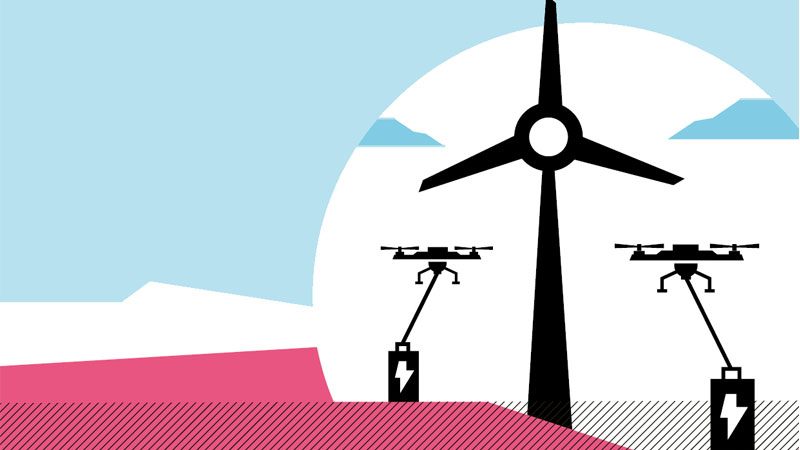Stay home, be productive
The coronavirus crisis will completely redefine the term “workplace”
It used to be a luxury to work from home. With the coronavirus, which forces millions of people into self-isolation, it has become a necessity. Will it be a win-win situation for both employers and employees?

The boss on the screen, the workplace at home. After the crisis this could become a permanent solutio. © GettyImages
How has our productivity changed during the coronavirus pandemic due to our dependence on online tools such as Slack, Zoom or Workspaces? And now we’re fully locked into the idea of remote working, can employer and employee behaviour really change for the better?
“This change is unprecedented,” says Stuart Templeton, UK head of workplace messaging company Slack. On March 10, his company had ten million connected users, by March 25 this had risen to 12.5 million. From February 1 to March 25, Slack added 9,000 new paid customers, which represented an 80 per cent increase in volume compared with the previous two quarters. This has also resulted in an acceleration of the number of messages shared among employers – a 20 per cent rise, in fact.
Trust is important
Slack — alongside other workplace messaging apps like Microsoft Teams and Workplace by Facebook — have been inundated with photographs of people’s food, their pets, the view from their windows and even what they are eating on an almost constant basis. Annoying though these might be, they pale in comparison to some of more unpalatable colleagues and bosses on these sites. A tone-deaf employee’s Slack message went viral on Twitter: “I could do coronavirus for 6 months. This is doable.” An unreasonable boss sent a message on the same site to insist that workers should be “ready available, even through checking on the kids”.
But while it’s tempting to imagine millions of irritating Slack messages updating colleagues on local toilet roll supplies or the progress of homeschooling their kids, Templeton insists a rise in non-work related messaging has been healthy, and something employers are intelligently embracing. He believes companies must shift away from religiously monitoring how many hours employees have worked and move instead to a more flexible way of managing people, which is built on prioritising their mental health. “Making time to talk with your colleagues on work and non-work related matters is critical for a healthy and functioning work environment,” he says.
“Equally, don’t just rely on messages. Phone your colleagues, organise a video conference and allow yourself that little bit of extra time at the start of each meeting to check in with everyone on how they’re doing. Moving forward through this pandemic, organisations need to trust their employees and focus first and foremost on results, and not on time spent.”
How productive are we from home?
Joshua Zerkel, head of global community at workplace management platform Asana says people need to connect more than ever — “without it, we lose motivation and can feel extra isolated”. He believes there could be a fundamental shift in the way workers talk to one another, something which will continue long after the impact of the coronavirus has started to fade and might make workplaces more empathetic.
However, Scott Wark, a research associate at the University of Warwick’s Centre for Interdisciplinary Methodologies, believes a lot of the goodwill created by allowing workers the time to talk about non-work related issues will go away, as employers become paranoid over their productivity. He also wonders if some workers might struggle with all these changes. "Some people will be coping well with this change, but others, I suspect, won’t be getting much done at all, because many of us are habituated to using technology to chat rather than work. These habits take time to build.”
He argues that while it’s good from a social point of view to get everyone on Slack or Team, it might not actually help some people work. "Conversely, will our workplaces decide that they need to surveil us more to ensure that we’re being productive?”
Trust and control
The tech world has been trying to sell remote working for decades, and Wark expects coronavirus to accelerate the number of firms embracing it, especially because it will allow them to cut operating costs in the years ahead and help lessen any economic impact the pandemic might have.
But Wark warns that this could also have dark implications and that by not being in an office, which is filled with distractions, we might end up tied to our laptops, scared to take a break. “We really could see the spread of surveillance technologies that monitor how much we’re doing and when,” he warns. “If more people work from home, there will be more paranoia among employers about what they’re getting up to.” This lack of control, he believes, won’t sit well with all employers.
Increased productivity
According to research from Forrester, 69 per cent of people who already worked from home at least four days a week before the pandemic believe it helps them to be better at their jobs and more productive. Yet Forrester analyst Andrew Hewitt says companies would be “foolish” to expect the same level of productivity to continue right now.
“Individuals are building in more non-work social time to allow people to connect with each and discuss the impact of the virus or just have a casual catch up,” he explains. “What most people miss is that this is a good thing that will bring people closer together. But to expect the same level of productivity during this time of extreme anxiety is foolish. People need additional social resources to be able to cope with the social increased demands.”
Now that employers have been forced to experiment with what mass remote-working looks like, our relationship with the office could be changed forever. An entire company working from home is no longer just theoretical — and if it works, it could become permanent. If it does, an unlucky few could be trapped with our most annoying colleagues forever, locked in constant back and forth exchanges, passive aggressively demanding instant results.
Whatever the outcome, Slack’s Templeton is sure of one thing: in the 2020s, he expects coronavirus to be a tipping point that convinces companies that remote working is full of advantages. “It’s part of a broader shift in mindset from focusing on hours worked to evaluating outputs. This is not about working less, it is about focusing on results over time spent.”
Is every meeting necessary?
Fair enough. But Asana and Slack both have skin in the remote working game. Especially Slack, which has seen its stock price soar as a result of coronavirus. For Wark, though, the changes might ultimately be more subtle – with our changes in behaviour around coronavirus seeping out into how we think about the climate crisis as well. “There’s a meme going around social media to the effect of, ‘Now we’ll learn which meetings could have been emails’. The opposite is also true – now we’ll learn which emails really should be meetings. I think we’ll learn a lot about how to value how we communicate with one another,” Wark says.
“We’re going to think hard before organising events for a while now, and question whether we all need to be in the same place for particular exchanges – for health reasons, but increasingly for environmental ones too.”
About the author:
Thomas Hobbs is editor of Wired UK. His report appears here as part of our publishing partnership with Wired UK.
You might also be interested in


